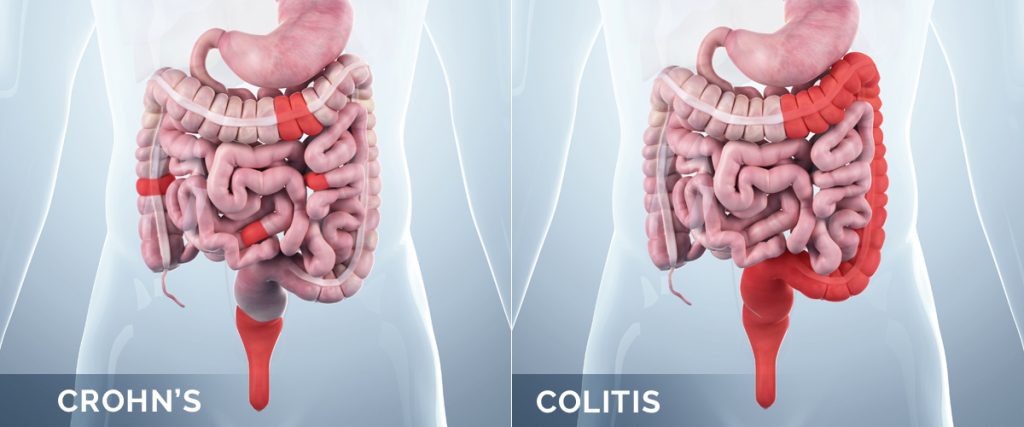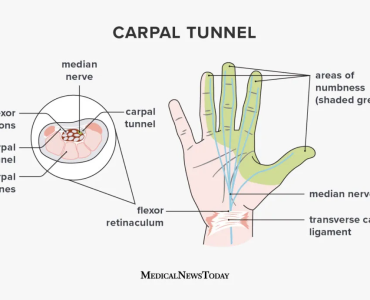Crohn’s disease and ulcerative colitis, collectively known as inflammatory bowel diseases (IBD), are chronic conditions that cause inflammation in the digestive tract. While they share similarities, they also have distinct characteristics. This guide aims to empower you with knowledge about both conditions, their causes, symptoms, treatment options, and navigating life with IBD.
Is Crohn’s and colitis the same thing?
No, Crohn’s disease and ulcerative colitis, though both considered inflammatory bowel diseases (IBD), have distinct characteristics:
- Crohn’s: This inflammation can affect any part of the digestive tract (mouth to anus) and involve the entire bowel wall, potentially causing fistulas (abnormal connections).
- Colitis: This inflammation only involves the inner lining of the large intestine (colon) and rectum, usually in a continuous manner.
the differences between Crohn’s disease and ulcerative colitis:
| Characteristic | Crohn’s Disease | Ulcerative Colitis |
|---|---|---|
| Location of Inflammation | Can affect any part of the digestive tract, from | Primarily affects the colon and rectum, rarely |
| the mouth to the anus, with skip lesions | extends beyond the colon | |
| Pattern of Inflammation | Inflammation can extend through the entire | Inflammation typically starts in the rectum and |
| thickness of the bowel wall, can involve multiple | spreads continuously along the colon | |
| layers of tissue | ||
| Distribution of Symptoms | Symptoms can vary widely depending on the location | Symptoms often include diarrhea with blood or mucus, |
| and severity of inflammation | abdominal pain, and urgency to have a bowel movement | |
| Complications | Strictures, fistulas, abscesses, perianal disease | Increased risk of colon cancer, toxic megacolon, |
| (inflammation around the anus) | and primary sclerosing cholangitis (PSC) | |
| Risk Factors | Genetic predisposition, environmental factors, | Genetic predisposition, family history of IBD, |
| immune system dysfunction | abnormal immune response, environmental factors | |
| Diagnostic Features | Endoscopy with biopsy, imaging tests (MRI, CT) | Endoscopy with biopsy, colonoscopy, stool tests, |
| imaging tests (MRI, CT) |
It’s important to note that both Crohn’s disease and ulcerative colitis are chronic inflammatory bowel diseases (IBD) with overlapping symptoms and treatments. However, their distinct characteristics and patterns of inflammation help differentiate between the two conditions. A gastroenterologist can provide a proper diagnosis and treatment plan based on individual symptoms and diagnostic tests.
How serious is Crohn’s colitis?
Both Crohn’s and colitis can range in severity, from mild (controlled with medication and lifestyle changes) to moderate or severe (requiring intensive treatment, hospitalization, or even surgery).

What is the life expectancy of a person with Crohn’s disease?
The good news is that with proper diagnosis and management, people with Crohn’s have a normal life expectancy. While the disease itself isn’t curable, effective treatments can control symptoms and significantly improve quality of life.
Does Crohn’s ever go away?
Crohn’s is a chronic condition, meaning it’s lifelong. However, it doesn’t have a constant course. Many individuals experience periods of remission (symptom-free) interspersed with flare-ups (increased symptoms). Treatment aims to prolong remissions and minimize flare-ups, allowing individuals to live full and active lives.
Understanding the Differences:
- Crohn’s Disease: This inflammatory condition can affect any part of the digestive tract, from the mouth to the anus, with inflammation transmural (affecting all layers of the bowel wall). It can appear in patches and cause fistulas (abnormal connections between organs).
- Ulcerative Colitis: This inflammation involves only the inner lining of the large intestine (colon) and rectum, usually in a continuous manner.
Causes:
The exact cause of IBD is unknown, but several factors are believed to contribute, including:
- Genetics: Having a family history of IBD increases your risk.
- Immune system: A malfunctioning immune system can attack the healthy tissues of the digestive tract.
- Environmental factors: Smoking, diet, and gut microbiome composition might play a role.
Symptoms:
Both Crohn’s and colitis can cause various symptoms, although the severity and specific ones can differ:
- Abdominal pain and cramping
- Diarrhea, often bloody with ulcerative colitis
- Urgency and frequency of bowel movements
- Fever, fatigue, and weight loss
- Nutritional deficiencies
Diagnosis:
Diagnosing IBD usually involves a combination of medical history, physical examination, blood tests, stool analysis, imaging tests (X-rays, CT scans, colonoscopy), and sometimes biopsies.
Treatment:
There’s no cure for IBD, but treatment focuses on managing symptoms, preventing flare-ups, and improving quality of life. Options include:
- Medications: Anti-inflammatory drugs, immunomodulators, biologics, and corticosteroids.
- Dietary changes: Eliminating trigger foods and following specific dietary plans can be helpful.
- Surgery: In some cases, surgery to remove diseased parts of the bowel might be necessary.
Living with IBD:
Living with IBD requires adjustments and lifestyle changes. Here are some tips:
- Adherence to medication: Taking medications as prescribed is crucial for managing symptoms and preventing flare-ups.
- Stress management: Chronic stress can worsen symptoms, so finding healthy coping mechanisms is important.
- Diet: Identifying and avoiding trigger foods and maintaining a healthy diet can improve symptoms.
- Support network: Connecting with other individuals with IBD can provide emotional and practical support.
- Open communication: Discussing your condition with family, friends, and healthcare providers can facilitate understanding and support.
Additional Resources:
- Crohn’s & Colitis Foundation: https://www.crohnscolitisfoundation.org/
- National Institute of Diabetes and Digestive and Kidney Diseases: [invalid URL removed]
- American Gastroenterological Association: https://gi.org/topics/inflammatory-bowel-disease/





